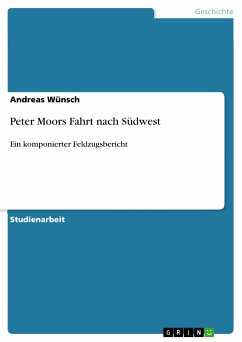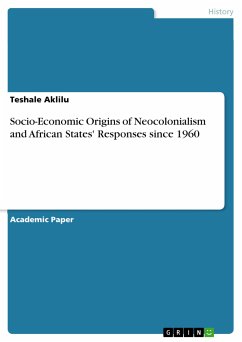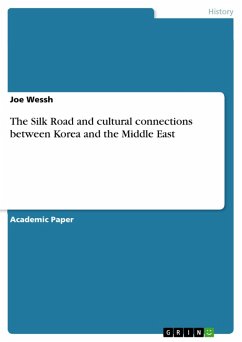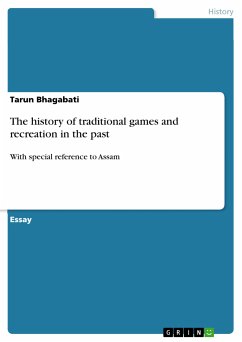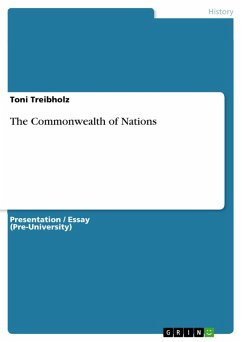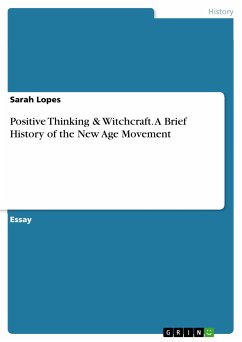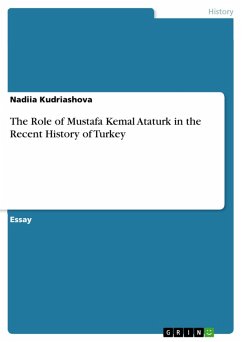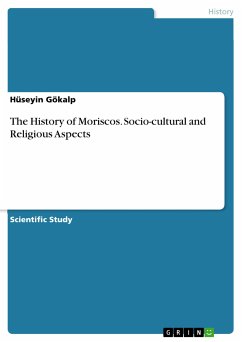
The History of Moriscos. Socio-cultural and Religious Aspects (eBook, PDF)
Sofort per Download lieferbar
Statt: 27,95 €**
18,99 €
inkl. MwSt. und vom Verlag festgesetzt.
**Preis der gedruckten Ausgabe (Broschiertes Buch)
Alle Infos zum eBook verschenkenWeitere Ausgaben:

PAYBACK Punkte
0 °P sammeln!
Scientific Study from the year 2010 in the subject World History - General and Comparison, grade: 80, , course: History of Islam, language: English, abstract: Our study deals with a period in which the Andalusian Muslims began to descend rapidly from the summit. We intend to examine from socio-cultural and religious perspectives the history of the Moriscos, the Berber, Arab, Jewish or Spanish Muslims, who witnessed the fall of Gnrata after choosing Islam as a religion. Then, exposed to deportations and repressions, but had to stay in Andalusia for various reasons, officially accepted Christian...
Scientific Study from the year 2010 in the subject World History - General and Comparison, grade: 80, , course: History of Islam, language: English, abstract: Our study deals with a period in which the Andalusian Muslims began to descend rapidly from the summit. We intend to examine from socio-cultural and religious perspectives the history of the Moriscos, the Berber, Arab, Jewish or Spanish Muslims, who witnessed the fall of Gnrata after choosing Islam as a religion. Then, exposed to deportations and repressions, but had to stay in Andalusia for various reasons, officially accepted Christianity but have sought to transfer the Islamic faith they have hidden to the next generations. If the 16th and 17th century Europe is well studied, it can be seen that the Spanish struggle against the Moriscos is not only a religious war. The Protestant war which was fought inside against the Germans that began to strengthen in the north, the rivalry with the British beyond the ocean, and the Ottoman threat in the Mediterranean and Europe, which could extend to their vicinity at any time, pushed the Spaniards to cooperate with the Vatican, and they tried to establish Catholic Spanish union as a strong backbone against the threats outside. A Morisco was seen as an Ottoman spy, a Protestant as a German spy and a Jewish as a British, Ottoman or French spy. Spaniards could not have a problem with just a muslim Morisco. The Christianization and expulsion of Muslims, who work more, who are more educated, who have technical staff and paid more taxes, took too long because of the strategy instabilities of the Spanish Kings on the way to the Great Spain. Morisco is the name given by the Spaniards to a nation that either was converted by will or by force from Islam to Christianity, in Spain or Portugal at the time when the Iberian peninsula was occupied by the Spaniards. This word was also used for people who did not adopt Christianity but had to profess Christian faith, and who secretly and operatively continued to be a Muslim. Similarly, in Spain, people who seemed to have accepted Christianity, but who maintained the belief in Judaism, were called "Marranos" or "Jews of Seferad". With the Reconquista and the recapture of the peninsula in just the beginning of the 1500s, Muslims began to be forced to become Catholics. Those who did not accept were sentenced to death, while some lucky ones managed to escape to Morocco. During this difficult period, a number of people preferred to accept the Catholic faith and save their lives.
Dieser Download kann aus rechtlichen Gründen nur mit Rechnungsadresse in A, B, BG, CY, CZ, D, DK, EW, E, FIN, F, GR, HR, H, IRL, I, LT, L, LR, M, NL, PL, P, R, S, SLO, SK ausgeliefert werden.





